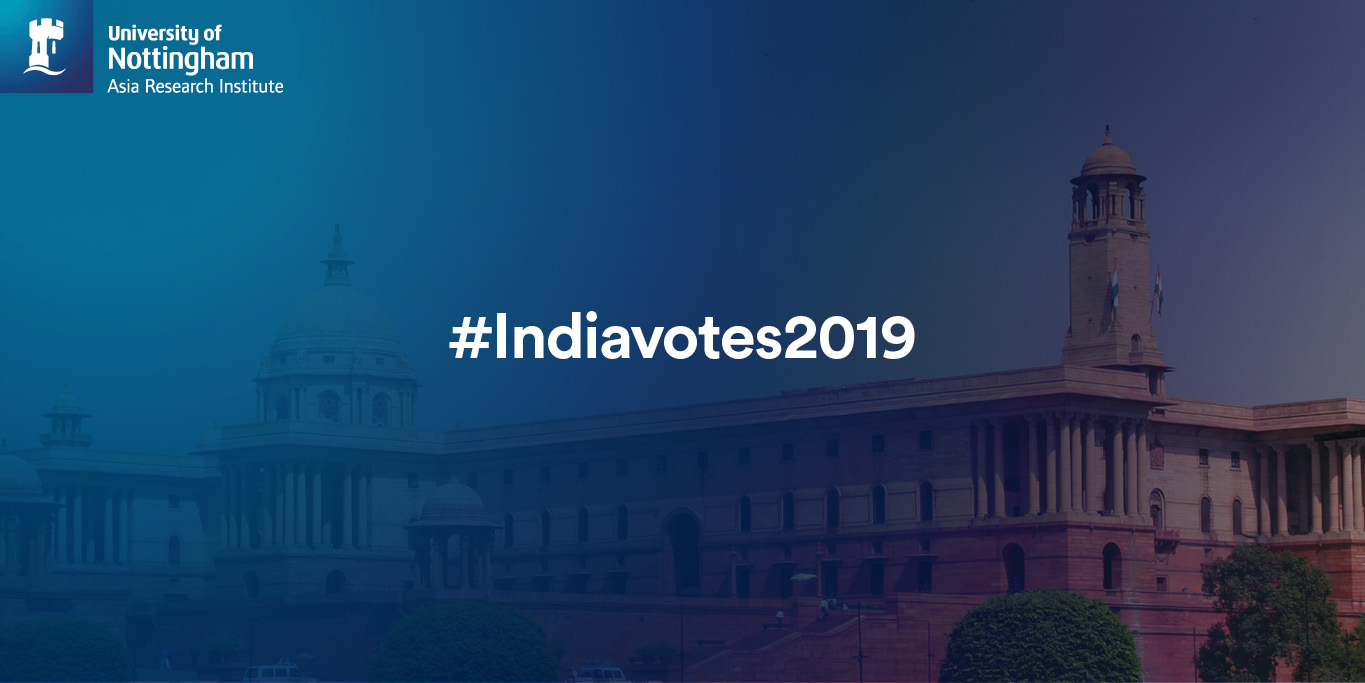Driving commercial and political engagement between Asia, the Middle East and Europe
Driving commercial and political engagement between Asia, the Middle East and Europe
Driving commercial and political engagement between Asia, the Middle East and Europe

Asia House is partnering with the University of Nottingham’s Asia Research Institute to keep you up-to-date on the Indian Elections 2019. Read their latest analysis on the largest democratic exercise in the world below.
What we know
This week saw the conclusion of the fifth phase of polling. Across the seven states of Bihar, Jammu and Kashmir, Jharkhand, Madhya Pradesh, Rajasthan, Uttar Pradesh and West Bengal, 51 seats went to polls. Among these seats, the Pulwama segment voted for the Anantnag Lok Sabha seat in Jammu and Kashmir, which in February saw one of the deadliest terror attacks in recent Indian history. However, the city experienced one of the lowest election turnouts, with only 2.14 per cent of eligible voters voting in Pulwama. In addition, there were at least three attempts to launch grenade attacks on polling booths in the city. The surrounding region, comprising the entirety of the Anantnag Lok Sabha seats, only managed to secure an 8.76 per cent turnout, down from 28.54 per cent in 2014. This seat is particularly important because the former Chief Minister of Jammu and Kashmir, Mehbooba Muft, is contesting the elections. With the majority of voters in Pulwama apparently boycotting the elections, the very nature of an elected representative, and that too of the former Chief Minister, comes into question.
In a different part of India, speaking at a rally in Pratapgarh, Uttar Pradesh, Prime Minister Narendra Modi said: “Your father [referring to Rahul Gandhi’s father, Rajiv Gandhi] was termed Mr. Clean by his courtiers, but his life ended as Brashtachari [corrupt] No.1”. Many commentators termed the remark as ‘new low’ in Indian politics, where even a former assassinated Prime Minister [Rajiv Gandhi] is not spared from the continuation of personal attacks between the Bharatiya Janata Party (BJP) and the Congress Party. Many commentators of Indian politics have argued that these comments come at a time when a number of important seats with a significant Sikh population go to polls in the sixth and seventh phase. By bringing Rajiv Gandhi into the current political discourse, the BJP and Prime Minister Narendra Modi are trying to revive the horrors of the 1984 Sikh genocide in which many senior Congress leaders are held culpable.
The incumbent Chief Minister of Delhi, Arvind Kejriwal of the Aam Admi Party, was slapped during a roadshow in west Delhi’s Moti Nagar area, reviving the issue of security during the elections. Rather than being the state’s responsibility, the police force in New Delhi is controlled by the central government. The opposition party has called into question the ability of the central government to ensure the safety of its citizens.
More violence between the BJP and Trinamool Congress was reported in seats that went to poll in West Bengal. The campaign has taken a bitter turn, with a “war on words” between Prime Minister Modi and Chief Minister Mamata Banerjee taking place in the region. So bitter is the campaign that the West Bengal government has refused to hold a review meeting with Prime Minister Modi to assess the damage caused by Cyclone Fani.
What we think
The continued low turnout in Jammu and Kashmir’s parliamentary seats reveals the political disillusionment of the citizens of the state. The continued attacks against Kashmiri citizens across the rest of India in the wake of the Pulwama attack have further alienated the state from the rest of the country.
Prime Minister Modi’s remark on former Prime Minister Rajiv Gandhi clearly illustrates the personalised and negative tone of the campaign that this election season has taken. Rather than campaigning on economic issues, it serves Prime Minister Modi’s political interest to target the Nehru-Gandhi family. Moreover, it places the Congress Party on the back foot, with the majority of its leaders and spokespersons coming out in defence of Rajiv Gandhi in contrast to providing their vision for the future. The Prime Minister’s remarks has brought back the issue of the Bofors scam and the 1984 Sikh genocide into current political discourse.
The current campaign in the state of West Bengal is particularly interesting, where the BJP is trying very hard, and has succeeded in some places, to revive the history of communal rioting in the state. However, the BJP is met with a strong opposition in the state, led by Mamata Banerjee of the Trinamool Congress (not to be confused with the Congress Party). Unlike the Congress Party, Mamata Banerjee goes on the offensive, playing the regional card against the BJP’s communal campaign.
Things to watch out for next week
With the conclusion of phase five, 118 of the 543 seats are left to be polled in the upcoming sixth and seventh phase. All seven seats of New Delhi will be polled on 12 May. In the absence of an electoral alliance between the Congress Party and the AAP in New Delhi, it remains to be seen whether the BJP will be able to benefit from the division of the ‘secular’ vote between the Congress Party and the AAP.
The University of Nottingham Asia Research Institute is a community of world-leading research comprised of 200 Asia experts across the University’s three campuses (UK, China and Malaysia). View: Blog| Asia Expertise| India Expertise
*This article has been modified in line with Asia House editorial guidelines.
